Second Amendment to the United States Constitution

The Second Amendment to the United States Constitution, relating to the right of people to bear arms, was enacted as part of the Bill of Rights, its ratification occurring on 15 December 1791 with the support of the Virginia Legislature.
Text of the Second Amendment
[edit]
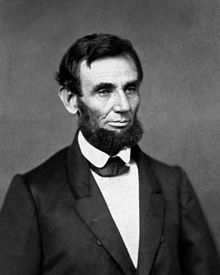


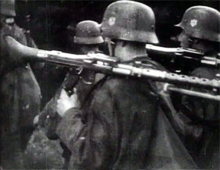
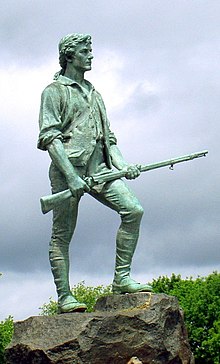

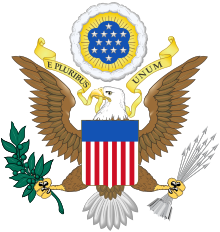

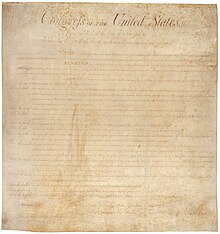
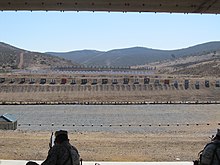



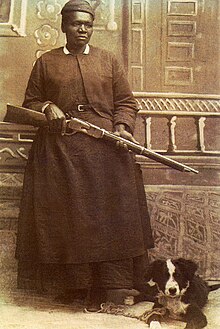




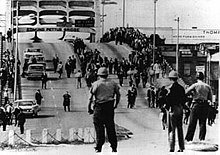
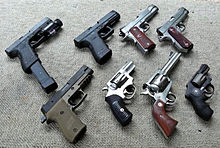


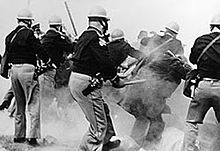


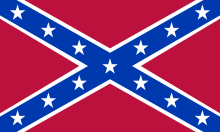
The Second Amendment, as passed by the House and Senate and later ratified by the States, reads:
- A well regulated militia being necessary to the security of a free State, the right of the People to keep and bear arms shall not be infringed.
The hand-written copy of the Bill of Rights which hangs in the National Archives had slightly different capitalization and punctuation inserted by William Lambert, the scribe who prepared it. This copy reads:
- A well regulated Militia, being necessary to the security of a free State, the right of the people to keep and bear Arms, shall not be infringed.
Both versions are commonly used by "official" U.S. government publications.
Earlier proposals and drafts of the Amendment
[edit]- And that the said Constitution be never construed to authorize Congress to infringe the just liberty of the press, or the rights of conscience; or to prevent the people of the United States, who are peaceable citizens, from keeping their own arms. - Unknown
- (6 February 1788), reported in Charles Hale, Debates and Proceedings in the Convention of the Commonwealth of Massachusetts (1856), p. 86. This language was proposed in the Massachusetts convention for ratification of the U.S. Constitution to be added to Article I of that document. And the question being put, was determined in the negative.
- The right of the people to keep and bear arms shall not be infringed; a well armed and well regulated militia being the best security of a free country; but no person religiously scrupulous of bearing arms shall be compelled to render military service in person.
- Original text of what was to become the Second Amendment, as brought to the floor to the first session of the first congress of the U.S. House of Representatives. original text
- A well regulated militia, composed of the body of the people, being the best security of a free State, the right of the people to keep and bear arms shall not be infringed, but no person religiously scrupulous shall be compelled to bear arms.
- Reworded version of the Second Amendment by the select committee on the Bill of Rights, July 28th 1789. AoC pp. 669).
- A well regulated militia, composed of the body of the people, being the best security of a free state, the right of the people to keep and bear arms shall not be infringed; but no one religiously scrupulous of bearing arms shall be compelled to render military service in person.
- Draft version of the Second Amendment sent by the House of Representatives to the United States Senate, on August 24th, 1789. (Note: When the Amendment was transcribed, the semicolon in the religious exemption portion was changed to a comma by the Senate scribe).
- A well regulated militia, being the best security of a free state, the right of the people to keep and bear arms, shall not be infringed
- Revision voted on in the U.S. Senate, September 4th, 1789.
- A well regulated militia being the security of a free state, the right of the people to keep and bear arms shall not be infringed.
- Final version passed by the U.S. Senate; the phrase "necessary to" was added when the proposed Amendment was entered into the U.S. House journal.
State Constitutional Precursors to the 2nd Amendment
[edit]| Related Articles & Sections within the first State Constitutions Adopted after May 10, 1776.
On May 10, 1776, Congress passed a resolution recommending that any colony with a government that was not inclined toward independence should form one that was.[1] |
Virginia, June 12, 1776[edit]Virginia’s Constitution lists the reasons for dissolving its ties with the King in the formation of its own independent state government. Including the following:
|
Pennsylvania, September 28, 1776[edit]Article 13. That the people have a right to bear arms for the defence of themselves and the state; and as standing armies in the time of peace are dangerous to liberty, they ought not to be kept up; And that the military should be kept under strict subordination to, and governed by, the civil power.[3] IMPORTANT NOTE: This is the first instance of the phrase "right to bear arms." It is of relevance that Pennsylvania was a Quaker Colony. "In settling Pennsylvania, William Penn had a great experiment in view, a ‘holy experiment,’ as he term[ed] it. This was no less than to test, on a scale of considerable magnitude, the practicability of founding and governing a State on the sure principles of the Christian religion; where the executive should be sustained without arms; where justice should be administered without oaths; and where real religion might flourish without the incubus of a hierarchical system."[4] The Non-Quaker residents, many from the Western Counties, complained often and loudly of being denied the right to a common defense. By the time of the American Revolution, through what could be described as a revolution within a revolution, the pro-militia factions had gained ascendancy in the state's government. And by a manipulation through the use of oaths, disqualifying Quaker members, they made up a vast majority of the convention forming the new state constitution; it was only natural that they would assert their efforts to form a compulsory State Militia in the context of a "right" to defend themselves and the state.[5] |
Maryland, November 11, 1776[edit]Articles XXV-XXVII. 25. That a well-regulated militia is the proper and natural defence of a free government. 26. That standing armies are dangerous to liberty, and ought not to be raised or kept up, without consent of the Legislature. 27. That in all cases, and at all times, the military ought to be under strict subordination to and control of the civil power.[6] |
North Carolina, December 18, 1776[edit]A Declaration of Rights. Article XVII. That the people have a right to bear arms, for the defence of the State; and, as standing armies, in time of peace, are dangerous to liberty, they ought not to be kept up; and that the military should be kept under strict subordination to, and governed by, the civil power.[7] |
New York, April 20, 1777[edit]Article XL. And whereas it is of the utmost importance to the safety of every State that it should always be in a condition of defence; and it is the duty of every man who enjoys the protection of society to be prepared and willing to defend it; this convention therefore, in the name and by the authority of the good people of this State, doth ordain, determine, and declare that the militia of this State, at all times hereafter, as well in peace as in war, shall be armed and disciplined, and in readiness for service. That all such of the inhabitants of this State being of the people called Quakers as, from scruples of conscience, may be averse to the bearing of arms, be therefrom excused by the legislature; and do pay to the State such sums of money, in lieu of their personal service, as the same; may, in the judgment of the legislature, be worth. And that a proper magazine of warlike stores, proportionate to the number of inhabitants, be, forever hereafter, at the expense of this State, and by acts of the legislature, established, maintained, and continued in every county in this State.[8] |
Vermont, July 8, 1777[edit]Chapter 1. Section XVIII. That the people have a right to bear arms for the defence of the themselves and the State; and as standing armies, in the time of peace, are dangerous to liberty, they ought not to be kept up; and that the military should be kept under strict subordination to, and governed by, the civil power.[9] |
Massachusetts, June 15, 1780[edit]A Declaration of Rights. Chapter 1. Article XVII. The people have a right to keep and to bear arms for the common defence. And as, in time of peace, armies are dangerous to liberty, they ought not to be maintained without the consent of the legislature; and the military power shall always be held in an exact subordination to the civil authority and be governed by it.[10] |
Quotes relating to the adoption of the Amendment
[edit]- The following statements were made by various founding fathers prior to the adoption of the Second Amendment. While most date from before the wording of the second amendment was established, four were made during the 1789 debates over its adoption:
- A well-regulated militia, composed of the body of the people, trained to arms, is the proper, natural, and safe defense of a free state; that standing armies, in time of peace, should be avoided as dangerous to liberty; and that in all cases the military should be under strict subordination to, and governed by, the civil power.
- Virginia Declaration of Rights (12 June 1776)
- [T]he people have a right to bear arms for the defence of themselves.
- "A Declaration of Rights of the Inhabitants of the Commonwealth or State of Pennsylvania", Constitution of the Commonwealth of Pennsylvania (28 September 1776)
- [P]eople have a right to bear arms for the defence of themselves.
- "Chapter 1: A Declaration of the Rights of the Inhabitants of the State of Vermont", Constitution of the State of Vermont (8 July 1777)
- It is true, the yeomanry of the country possess the lands, the weight of property, possess arms, and are too strong a body of men to be openly offended-and, therefore, it is urged, they will take care of themselves, that men who shall govern will not dare pay any disrespect to their opinions. It is easily perceived, that if they have not their proper negative upon passing laws in congress, or on the passage of laws relative to taxes and armies, they may in twenty or thirty years be by means imperceptible to them, totally deprived of that boasted weight and strength: This may be done in great measure by congress, if disposed to do it, by modelling the militia. Should one fifth, or one eighth part of the men capable of bearing arms, be made a select militia, as has been proposed, and those the young and ardent part of the community, possessed of but little or no property, and all the others put upon a plan that will render them of no importance, the former will answer all the purposes of an army, while the latter will be defenceless.
- Letters from the Federal Farmer to the Republican, III (November 1787)
Thomas Jefferson
[edit]- No freeman shall ever be debarred the use of arms.
- Proposed Virginia Constitution, June, 1776.
- Occasionally this quote attributed to Thomas Jefferson is given with the following citation: Thomas Jefferson Papers, 334 (C.J.Boyd, Ed., 1950). The publication exists, but the quote does not. And the editor's correct name is Julian P. Boyd, not C.J. Boyd. In other cases, this quote is added to the end of a proven Jefferson quote "No free man shall ever be debarred the use of arms..." Thomas Jefferson, Proposed Virginia Constitution, 1776, Jefferson Papers 344. What he actually said, in context of the Virginia Constitution drafts is:
- Draft 1: "No Freeman shall ever be debarred the use of arms."1.
- Draft 2: "No Freeman shall be debarred the use of arms [in his own lands or tenements]."
- Draft 3: "No Freeman shall be debarred the use of arms [in his own lands or tenements]."
- As to the species of exercise, I advise the gun. While this gives a moderate exercise to the body, it gives boldness, enterprise, and independence to the mind. Games played with the ball, and others of that nature, are too violent for the body, and stamp no character on the mind. Let your gun therefore be the constant companion of your walks. Never think of taking a book with you.
- Thomas Jefferson, letter to his nephew Peter Carr (19 August 1785), from Paris, France.
- God forbid we should ever be twenty years without such a rebellion. The people cannot be all, and always, well informed. The part which is wrong will be discontented, in proportion to the importance of the facts they misconceive. If they remain quiet under such misconceptions, it is lethargy, the forerunner of death to the public liberty.
- Thomas Jefferson, letter to William Stephens Smith (13 November 1787), quoted in Padover's Jefferson On Democracy.
- What country before ever existed a century and half without a rebellion? And what country can preserve its liberties if their rulers are not warned from time to time that their people preserve the spirit of resistance? Let them take arms. The remedy is to set them right as to facts, pardon and pacify them. What signify a few lives lost in a century or two? The tree of liberty must be refreshed from time to time with the blood of patriots and tyrants. It is its natural manure.
- Thomas Jefferson, letter to William Stephens Smith (13 November 1787), quoted in Padover's Jefferson On Democracy.
- One loves to possess arms, though they hope never to have occasion for them.
- Thomas Jefferson, letter to George Washington, 1796. As quoted in The Writings of Thomas Jefferson, Lipscomb and Bergh, editors, 20 Vols., Washington, D.C., 1903-04, 9:341.
- For a people who are free, and who mean to remain so, a well organized and armed militia is their best security.
- Thomas Jefferson, Eighth State of the Union Address (8 November 1808)
- The constitutions of most of our States assert, that all power is inherent in the people; that they may exercise it by themselves, … or they may act by representatives, freely and equally chosen; that it is their right and duty to be at all times armed; that they are entitled to freedom of person, freedom of religion, freedom of property, and freedom of the press.
- Thomas Jefferson, Letter to Major John Cartwright (5 June 1824)
John Adams
[edit]- Here every private person is authorized to arm himself, and on the strength of this authority, I do not deny the inhabitants had a right to arm themselves at that time, for their defense, not for offence.
- As defense attorney for the British soldiers on trial for the Boston Massacre. Reported in L. Kinvin Wroth and Hiller B. Zobel, ed., Legal Papers of John Adams (Cambridge, Mass: Harvard University Press, 1965), 3:248.
- To see that the people be continually trained up in the exercise of arms, and the militia lodged only in the people's hands.
- Marchamont Nedhams, reported in Adams', A Defense of the Constitutions of the Government of the United States of America 3:471 (1788); Adams wrote there that "[T]he rule in general is excellent".
- To suppose arms in the hands of citizens, to be used at individual discretion, except in private self-defense, or by partial orders of towns, countries or districts of a state, is to demolish every constitution, and lay the laws prostrate, so that liberty can be enjoyed by no man; it is a dissolution of the government. The fundamental law of the militia is, that it be created, directed and commanded by the laws, and ever for the support of the laws.
- A Defence of the Constitutions of the United States 3:475 (1787-1788).
James Madison
[edit]- The highest number to which, according to the best computation, a standing army can be carried in any country, does not exceed one hundredth part of the whole number of souls; or one twenty-fifth part of the number able to bear arms. This proportion would not yield, in the United States, an army of more than twenty-five or thirty thousand men. To these would be opposed a militia amounting to near half a million of citizens with arms in their hands, officered by men chosen from among themselves, fighting for the common liberties and united and conducted by governments possessing their affections and confidence. It may well be doubted whether a militia thus circumstanced could ever be conquered by such a proportion of regular troops. Those who are best acquainted with the late successful resistance of this country against the British arms will be most inclined to deny the possibility of it. Besides the advantage of being armed, which the Americans possess over the people of almost every other nation, the existence of subordinate governments, to which the people are attached and by which the militia officers are appointed, forms a barrier against the enterprises of ambition, more insurmountable than any which a simple government of any form can admit of. Notwithstanding the military establishments of the several kingdoms of Europe, which are carried as far as the public resources will bear, the governments are afraid to trust the people with arms.
- Federalist No. 46 (1788).
- In framing a government which is to be administered by men over men, the great difficulty lies in this: you must first enable the government to control the governd; and in the next place oblige it to control itself. A dependence on the people is, no doubt, the primary control on the government; but experience has taught mankind the necessity of auxiliary precautions.
- Federalist No. 51 (February 8, 1788).
George Mason
[edit]George Mason is considered the "Father of the Bill of Rights." Mason wrote the Virginia Declaration of Rights, which detailed specific rights of citizens. He was later a leader of those who pressed for the addition of explicitly stated individual rights as part of the U.S. Constitution.
- [W]hen the resolution of enslaving America was formed in Great Britain, the British Parliament was advised by an artful man, who was governor of Pennsylvania, to disarm the people; that it was the best and most effectual way to enslave them; but that they should not do it openly, but weaken them, and let them sink gradually. . . .
- At Virginia's U.S. Constitution ratification convention (June 14, 1788), reported in Elliot, Debates of the Several State Conventions 3:380.
- I ask, who are the militia? They consist now of the whole people, except a few public officers. But I cannot say who will be the militia of the future day. If that paper on the table gets no alteration, the militia of the future day may not consist of all classes, high and low, and rich and poor. . . .
- Virginia's U.S. Constitution ratification convention (June 16, 1788), reported in Elliot, Debates of the Several State Conventions 3:425.
- That the People have a right to keep and bear Arms; that a well regulated Militia, composed of the Body of the People, trained to arms, is the proper, natural, and safe Defence of a free state.
- Within Mason's declaration of "the essential and unalienable Rights of the People", later adopted by the Virginia ratification convention (1788).
Patrick Henry
[edit]- Guard with jealous attention the public liberty. Suspect everyone who approaches that jewel. Unfortunately, nothing will preserve it but downright force. Whenever you give up that force, you are inevitably ruined.
- Virginia's U.S. Constitution ratification convention (June 5, 1788), reported in Elliot, Debates of the Several State Conventions 3:45.
- My great objection to this government is, that it does not leave us the means of defending our rights or of waging war against tyrants.
- Virginia's U.S. Constitution ratification convention (June 5, 1788), reported in Elliot, Debates of the Several State Conventions 3:47.
- [W]here and when did freedom exist when the power of the sword and purse were given up from the people?
- Virginia's U.S. Constitution ratification convention (June 9, 1788), Elliot, Debates of the Several State Conventions, 3:169.
Tench Coxe
[edit]- The militia, who are in fact the effective part of the people at large, will render many troops quite unnecessary. They will form a powerful check upon the regular troops, and will generally be sufficient to over-awe them.
- Tench Coxe, Delegate to Continental Congress, October 21, 1787.
- The power of the sword, say the minority..., is in the hands of Congress. My friends and countrymen, it is not so, for The powers of the sword are in the hands of the yeomanry of America from sixteen to sixty. The militia of these free commonwealths, entitled and accustomed to their arms, when compared with any possible army, must be tremendous and irresistible. Who are the militia? Are they not ourselves? Is it feared, then, that we shall turn our arms each man against his own bosom. Congress has no power to disarm the militia. Their swords and every terrible implement of the soldier are the birthright of Americans...The unlimited power of the sword is not in the hands of either the federal or state governments but where, I trust in God, it will always remain, in the hands of the people.
- Tench Coxe, The Pennsylvania Gazette (February 20, 1788). A friend of James Madison, Coxe wrote in support of the Madison's first draft of the Bill of Rights. A substantially similar passage, with minor changes, appeared in the Federal Gazette (June 18, 1789).
Thomas Paine
[edit]- [A]rms like laws discourage and keep the invader and the plunderer in awe, and preserve order in the world as well as property. The balance of power is the scale of peace. The same balance would be preserved were all the world destitute of arms, for all would be alike; but since some will not others dare not lay them aside. And while a single nation refuses to lay them down, it is proper that all should keep them up. Horrid mischief would ensue were one half the world deprived of the use of them; for while avarice and ambition have a place in the heart of man, the weak will become a prey to the strong. The history of every age and nation establishes these truths, and facts need but little arguments when they prove themselves.
- Thomas Paine, as quoted in "Thoughts On Defensive War" (1775), by T. Paine, Pennsylvania Magazine (July 1775).
Alexander Hamilton
[edit]- If circumstances should at any time oblige the government to form an army of any magnitude that army can never be formidable to the liberties of the people while there is a large body of citizens, little, if at all, inferior to them in discipline and the use of arms, who stand ready to defend their own rights and those of their fellow-citizens. This appears to me the only substitute that can be devised for a standing army, and the best possible security against it, if it should exist.
- To judge from the history of mankind, we shall be compelled to conclude, that the fiery and destructive passions of war reign in the human breast with much more powerful sway, than the mild and beneficent sentiments of peace ; and that to model our political system upon speculations of lasting tranquility, is to calculate on the weaker springs of the human character.
- Alexander Hamilton, Federalist No. 34 (5 January 1788).
- To oblige the great body of the yeomanry, and of the other classes of the citizens, to be under arms for the purpose of going through military exercises and evolutions, as often as might be necessary to acquire the degree of perfection which would entitle them to the character of a well-regulated militia, would be a real grievance to the people, and a serious public inconvenience and loss. It would form an annual deduction from the productive labor of the country, to an amount which, calculating upon the present numbers of the people, would not fall far short of the whole expense of the civil establishments of all the States. To attempt a thing which would abridge the mass of labor and industry to so considerable an extent, would be unwise: and the experiment, if made, could not succeed, because it would not long be endured. Little more can reasonably be aimed at, with respect to the people at large, than to have them properly armed and equipped; and in order to see that this be not neglected, it will be necessary to assemble them once or twice in the course of a year.
- Alexander Hamilton, Federalist No. 29 [[1]]
Noah Webster
[edit]- Before a standing army can rule, the people must be disarmed; as they are in almost every kingdom of Europe. The supreme power in America cannot enforce unjust laws by the sword; because the whole body of the people are armed, and constitute a force superior to any bands of regular troops that can be, on any pretense, raised in the United States.
- Noah Webster, writing under the nom de plume of "A Citizen of America", as quoted in An Examination Into the Leading Principles of the Constitution (17 October 1787).
Melancton Smith
[edit]- A militia when properly formed are in fact the people themselves...and include all men capable of bearing arms...To preserve liberty it is essential that the whole body of the people always possess arms, and be taught alike, especially when young, how to use them...The mind that aims at a select militia, must be influenced by a truly anti-republican principle.
- Melancton Smith, Additional Letters From The Federal Farmer, 1788.
Fisher Ames
[edit]- The rights of conscience, of bearing arms, of changing the government, are declared to be inherent in the people.
- Fisher Ames, Letter to F.R. Minoe, June 12, 1789 (reporting to Minoe on the amendments proposed by Madison).
Other quotes
[edit]- I simply cannot stand by and watch a right guaranteed by the Constitution of the United States come under attack from those who either can't understand it, don't like the sound of it, or find themselves too philosophically squeamish to see why it remains the first among equals: Because it is the right we turn to when all else fails. That's why the Second Amendment is America's first freedom.
- Charlton Heston, Speech to the National Press Club (September 14, 1997)
- Now, I doubt any of you would prefer a rolled up newspaper as a weapon against a dictator or a criminal intruder. Yet in essence, that is what you have asked our loved ones to do, through an ill-contrived and totally naive campaign against the Second Amendment.
- Charlton Heston, Speech to the National Press Club (September 14, 1997)
- You could say that the paparazzi and the tabloids are sort of the "assault weapons" of the First Amendment. They're ugly, a lot of people don't like them, but they're protected by the First Amendment — just as "assault weapons" are protected by the Second Amendment.
- Charlton Heston, Interview Fox News Channel (September 15, 1997)
- The importance of this article will scarcely be doubted by any persons, who have duly reflected upon the subject. The militia is the natural defence of a free country against sudden foreign invasions, domestic insurrections, and domestic usurpations of power by rulers. It is against sound policy for a free people to keep up large military establishments and standing armies in time of peace, both from the enormous expenses, with which they are attended, and the facile means, which they afford to ambitious and unprincipled rulers, to subvert the government, or trample upon the rights of the people. The right of the citizens to keep and bear arms has justly been considered, as the palladium of the liberties of a republic; since it offers a strong moral check against the usurpation and arbitrary power of rulers; and will generally, even if these are successful in the first instance, enable the people to resist and triumph over them. And yet, thought this truth would seem so clear, and the importance of a well regulated militia would seem so undeniable, it cannot be disguised, that among the American people there is a growing indifference to any system of militia discipline, and a strong disposition, from a sense of its burthens, to be rid of all regulations. How is it practicable to keep the people duly armed without some organization, it is difficult to see. There is certainly no small danger, that indifference may lead to disgust, and disgust to contempt; and thus gradually undermine all the protection intended by this clause of our national bill of rights.
- U.S. Supreme Court Justice Joseph Story in his Commentaries on the Constitution of the United States (1833), vol. 3, pp. 746-747.
- The rifle has ever been the companion of the pioneer, and, under God, his tutelary protector against the red man and the beast of the forest. Never was this efficient weapon more needed in just self-defence, than now in Kansas, and at least one article in our National Constitution must be blotted out; before the complete right to it can in any way be impeached. And yet such is the madness of the hour, that, in defiance of the solemn guarantee, embodied in the Amendments to the Constitution, that "the right of the people to keep and bear arms shall not be infringed." the people of Kansas have been arraigned for keeping and bearing them, and the senator from South Carolina has had the face to say openly, on this floor, that they should be disarmed -- of course, that the fanatics of slavery, his allies and constituents, may meet no impediment. Sir, the senator is venerable with years; he is reputed also to have worn at home, in the State which he represents, judicial honors; and he is placed here at the head of an important Committee occupied particularly with questions of law; but neither his years, nor his position, past or present, can give respectability to the demand he has made, or save him from indignant condemnation, when, to compass the wretched purposes of a wretched cause, he thus proposes to trample on one of the plainest provisions of constitutional liberty.
- Charles Sumner in his The Crime Against Kansas speech (May 19-20, 1856).
- No freedman, Negro, or Mulatto shall carry or keep firearms or ammunition.
- Mississippi Black Code (1865).
- A man's rights rest in three boxes. The ballot box, jury box and the cartridge box. Let no man be kept from the ballot box because of his color. Let no woman be kept from the ballot box because of her sex.
- Frederick Douglass, speech (15 November 1867).
- From the first I saw no chance of bettering the condition of the freedman until he should cease to be merely a freedman and should become a citizen. I insisted that there was no safety for him or for anybody else in America outside the American government; that to guard, protect, and maintain his liberty the freedman should have the ballot; that the liberties of the American people were dependent upon the ballot-box, the jury-box, and the cartridge-box; that without these no class of people could live and flourish in this country; and this was now the word for the hour with me, and the word to which the people of the North willingly listened when I spoke. Hence, regarding as I did the elective franchise as the one great power by which all civil rights are obtained, enjoyed, and maintained under our form of government, and the one without which freedom to any class is delusive if not impossible, I set myself to work with whatever force and energy I possessed to secure this power for the recently-emancipated millions.
- Frederick Douglass, The Life and Times of Frederick Douglass (1892), p. 460.
- Racist consider themselves superior beings and are not willing to exchange their superior lives for our inferior ones. They are most vicious and violent when they can practice violence with impunity.
- Robert F. Williams, as quoted in Negroes With Guns.
- I have asserted the right of Negroes to meet the violence of the Ku Klux Klan by armed self-defense, and have acted on it. It has always been an accepted right of Americans, as the history of our western states proves, that where the law is unable, or unwilling, to enforce order, the citizens can, and must act in self-defense against lawless violence.
- Robert F. Williams, as quoted in Negroes With Guns.
- The original Act of 1893 was passed when there was a great influx of negro laborers in this State drawn here for the purpose of working in turpentine and lumber camps. The same condition existed when the Act was amended in 1901 and the Act was passed for the purpose of disarming the negro laborers and to thereby reduce the unlawful homicides that were prevalent in turpentine and saw-mill camps and to give the white citizens in sparsely settled areas a better feeling of security. The statute was never intended to be applied to the white population and in practice has never been so applied.
- Justice Buford, Watson v. Stone (1941), Florida.
- Last but not least, I must say this concerning the great controversy over rifles and shotguns. The only thing that I’ve ever said is that in areas where the government has proven itself either unwilling or unable to defend the lives and the property of Negroes, it’s time for Negroes to defend themselves. Article number two of the constitutional amendments provides you and me the right to own a rifle or a shotgun. It is constitutionally legal to own a shotgun or a rifle. This doesn’t mean you’re going to get a rifle and form battalions and go out looking for white folks, although you’d be within your rights—I mean, you’d be justified; but that would be illegal and we don’t do anything illegal. If the white man doesn’t want the black man buying rifles and shotguns, then let the government do its job. [...] If he’s not going to do his job in running the government and providing you and me with the protection that our taxes are supposed to be for, since he spends all those billions for his defense budget, he certainly can’t begrudge you and me spending $12 or $15 for a single-shot, or double-action. I hope you understand. Don’t go out shooting people [...].
- Malcolm X in his The Ballot or the Bullet speech (3 April 1964).
- If guns are outlawed, only outlaws will have guns.
- Anonymous American adage, as quoted in The Wayward Welfare State (1981) by Roger A. Freeman, p. 286
- When guns are outlawed, only outlaws will have guns.
- Bumper sticker, quoted in Design with Type (1982) by Carl Dair, p. 174.
- The tank, the B-52, the fighter-bomber, the state-controlled police and military are the weapons of dictatorship. The rifle is the weapon of democracy. Not for nothing was the revolver called an "equalizer." Egalite implies liberte. And always will. Let us hope our weapons are never needed — but do not forget what the common people of this nation knew when they demanded the Bill of Rights: An armed citizenry is the first defense, the best defense, and the final defense against tyranny.
- Edward Abbey, Abbey's Road (1979).
- The very language of the Second Amendment refutes any argument that it was intended to guarantee every citizen unfettered right to any kind of weapon he or she desires.
- Warren E. Burger, former Chief Justice of the U.S. Supreme Court, in Keene Sentinel, 11/26/1991.
- If I were writing the Bill of Rights now there wouldn’t be any such thing as the Second Amendment . . . . This has been the subject of one of the greatest pieces of fraud, I repeat the word fraud, on the American public by special interest groups that I have ever seen in my lifetime.
- Warren E. Burger, former Chief Justice of the U.S. Supreme Court, Interview (from min 7:49) at MacNeil/Lehrer NewsHour by Charlayne Hunter-Gault, PBS television broadcast (Dec. 16, 1991)
- [The] National Rifle Association is always arguing that the Second Amendment determines the right to bear arms. But I think it really is the people's right to bear arms in a militia. The NRA thinks it protects their right to have Teflon-coated bullets. But that's not the original understanding.
- Robert Bork, in Miriam Bensimhorn, Advocates: Point and Counterpoint, Laurence Tribe and Robert Bork Debate the Framers' Spacious Terms, LIFE magazine, Fall 1991 (Special Issue).
- The historical record provides compelling evidence that racism underlies gun control laws; and not in any subtle way. Throughout much of American history, gun control was openly stated as a method for keeping blacks and Hispanics 'in their place', and to quiet the racial fears of whites. This paper is intended to provide a brief summary of this unholy alliance of gun control and racism, and to suggest that gun control laws should be regarded as "suspect ideas," analogous to the 'suspect classifications' theory of discrimination already part of the American legal system. Racist arms laws predate the establishment of the United States.
- Clayton E. Cramer, "The Racist Roots of Gun Control" (1995), by C.E. Cramer, Kansas Journal of Law and Public Policy (1995).
- The end of slavery in 1865 did not eliminate the problems of racist gun control laws; the various Black Codes adopted after the Civil War required blacks to obtain a license before carrying or possessing firearms or Bowie knives; these are sufficiently well-known that any reasonably complete history of the Reconstruction period mentions them. These restrictive gun laws played a part in the efforts of the Republicans to get the Fourteenth Amendment ratified, because it was difficult for night riders to generate the correct level of terror in a victim who was returning fire. It does appear, however, that the requirement to treat blacks and whites equally before the law led to the adoption of restrictive firearms laws in the south that were equal in the letter of the law, but unequally enforced. It is clear that the vagrancy statutes adopted at roughly the same time, in 1866, were intended to be used against blacks, even though the language was race-neutral. The former states of the Confederacy, many of which had recognized the right to carry arms openly before the civil war, developed a very sudden willingness to qualify that right. One especially absurd example, and one that includes strong evidence of the racist intentions behind gun control laws, is Texas.
- Clayton E. Cramer, "The Racist Roots of Gun Control" (1995), by C.E. Cramer, Kansas Journal of Law and Public Policy (1995).
- The question might be asked what relevance the racist past of gun control laws has. One concern is that the motivations for disarming blacks in the past are really not so different from the motivations for disarming law-abiding citizens today. In the last century, the official rhetoric in support of such laws was that 'they' were too violent, too untrustworthy, to be allowed weapons. Today, the same elitist rhetoric regards law-abiding Americans in the same way, as child-like creatures in need of guidance from the government. In the last century, while never openly admitted, one of the goals of disarming blacks was to make them more willing to accept various forms of economic oppression, including the sharecropping system, in which free blacks were reduced to an economic state not dramatically superior to the conditions of slavery.
- Clayton E. Cramer, "The Racist Roots of Gun Control" (1995), by C.E. Cramer, Kansas Journal of Law and Public Policy (1995).
- Gun control has historically been a tool of racism, and associated with racist attitudes about black violence. Similarly, many gun control laws impinge on that most fundamental of rights, self-defense. Racism is so intimately tied to the history of gun control in America that we should regard gun control aimed at law-abiding people as a 'suspect idea', and require that the courts use the same demanding standards when reviewing the constitutionality of a gun control law, that they would use with respect to a law that discriminated based on race.
- Clayton E. Cramer, "The Racist Roots of Gun Control" (1995), by C.E. Cramer, Kansas Journal of Law and Public Policy (1995).
- If gun laws in fact worked, the sponsors of this type of legislation should have no difficulty drawing upon long lists of examples of crime rates reduced by such legislation. That they cannot do so after a century and a half of trying — that they must sweep under the rug the southern attempts at gun control in the 1870-1910 period, the northeastern attempts in the 1920-1939 period, the attempts at both Federal and State levels in 1965-1976 — establishes the repeated, complete and inevitable failure of gun laws to control serious crime.
- Orrin Hatch, "The Right to Keep and Bear Arms".
- Madison did not invent the right to keep and bear arms when he drafted the Second Amendment – the right was pre-existing at both common law and in the early state constitutions.
- Thomas B. McAffee & Michael J. Quinlan, "Bringing Forward The Right To Keep And Bear Arms: Do Text, History, Or Precedent Stand In The Way?", North Carolina Law Review (March 1997), p. 781.
- Nothing in the history, construction, or interpretation of the Amendment applies or infers such a protection. Rather, legal protection for personal self-defense arises from the British common law tradition and modern criminal law; not from constitutional law.
- Robert J. Spitzer, "Lost and Found: Researching the Second Amendment", Chicago Kent Law Review 76, no. 1 (2000): pp. 349-401.
- Consider, for example, the term 'people' in the First Amendment—'Congress shall make no law . . . prohibiting . . . the right of the people peaceably to assemble . . . . '[180] If it is hard to construe the word 'people' in the Fourth Amendment to be anything but a reference to individuals, it is equally difficult to construe the term in the First Amendment as anything but a collective right. Clearly, the idea of the people assembling contemplates a large [Page 231] number of people and not a single person assembling. Thus, linguistically, the term 'people' in the Second Amendment might be interpreted 'either way.' Standing alone, the phrase 'the right of the people to keep and bear arms' could apply to individuals or collectively to 'the people.' But, unlike the use of the word in the Fourth Amendment, the Second Amendment ties the term 'people' to a collective entity, the 'well regulated Militia' which is 'necessary to the security of a free State.' This understanding is also supported by the original wording of the Amendment, which referred to the 'body' of the people. Linguistically, the Amendment can easily be read to concern the 'body'of the people. The Amendment does not say, 'individually armed citizens, being necessary to the security of a free state . . . . ' The Amendment explicitly refers to the 'militia,' a collective organization and a specific kind of militia at that one that is 'well regulated.' It is hard to imagine individuals being 'well regulated' by the government. They are only 'regulated' as a group.
- Paul Finkleman, "'A Well Regulated Militia': The Second Amendment in Historical Perspective", Chicago-Kent Law Review Symposium on the Second Amendment vol. 76, (2000) : 195.
- Why would an ultimately factual question about the consequences of gun control laws divide people along ideological lines? Only if at least one set of people were more devoted to their vision than to the facts. This shows up when gun control zealots are asked whether whatever new law they propose would have prevented the shooting rampage that they are using as a stage from which to propose a new clampdown on gun ownership. Almost always, the new law being proposed would not have made the slightest difference. That too is part of the farce. A deadly farce. So is the automatic assertion that whoever engaged in a shooting rampage was a madman. Yet these supposedly crazy shooters are usually rational enough to choose some "gun-free zone" for their murderous attacks. They seem more rational than gun control zealots who keep creating more 'gun-free zones'. Gun control zealots are almost always people who are lenient toward criminals, while they are determined to crack down on law-abiding citizens who want to be able to defend themselves and their loved ones.
- Thomas Sowell, "The 'Gun Control' Farce" (13 October 2015), Jewish World Review.
- The grand illusion of zealots for laws preventing ordinary, law-abiding people from having guns is that "gun control" laws actually control guns. In a country with many millions of guns, not all of them registered, this is a fantasy and a farce. Guns do not vanish into thin air because there are gun control laws. Guns — whether legal or illegal — can last for centuries. Passing laws against guns may enable zealots to feel good about themselves, but at the cost of other people's lives. Why anyone would think that criminals who disobey other laws, including laws against murder, would obey gun control laws is a mystery. A disarmed population makes crime a safer occupation and street violence a safer sport.
- Thomas Sowell, "The 'Gun Control' Farce: Part II" (14 October 2015), Jewish World Review.
- Almost invariably, mass shootings occur in gun-free settings. Yet gun control zealots seem determined to create more gun-free settings. How often have supposedly mentally unbalanced shooters opened fire at a meeting of the National Rifle Association? They are apparently not that mentally unbalanced. They pick places where people are not likely to shoot back. A mass shooting at a movie theater a few years ago took place at a theater farther away from where the shooter lived than other theaters in the area that were showing the very same movie. The difference was that this theater had advertised that it was a gun-free zone. Who is more mentally unbalanced, those who are doing the shooting or those who refuse to examine the facts about what kinds of places attract such shooters? Schools and religious institutions are sitting ducks, and the shootings there have gone on until someone else with a gun showed up on the scene. That is what puts an end to the carnage, not gun control laws. People who are prepared to defy the laws against murder are not very likely to be stopped by laws against guns. Only law-abiding citizens are likely to be stopped by gun control laws, and to become sitting ducks. As for facts and statistics, the only ones likely to be mentioned by gun control zealots, including the media, are those on how many people were killed by guns. How many lives were saved by guns will never make it through the ideological filters of the media, the political establishment or our educational institutions. Yet factual data on how many threats or attacks were deterred in a given year by displaying a firearm have long been available. Seldom is it necessary to actually pull the trigger to get some thug or criminal to back off and go elsewhere, often in some haste. Are the only lives that matter those that are lost, usually because there is no gun immediately available to protect them, but not the lives saved because they did have a gun at hand to protect them? Gun control zealots seem especially opposed to people being allowed to carry their guns concealed. But concealed weapons protect not only those who carry them, but also to some extent those who do not, because criminals have no way of knowing in advance who does and does not have a gun. Muggings and rapes become much more dangerous activities for criminals where many law-abiding people are allowed to carry concealed guns. It can take a lot of the fun out of being a thug.
- Thomas Sowell, "Showman-in-Chief" (6 January 2016), Jewish World Review.
- The majority falls prey to the delusion, popular in some circles, that ordinary people are too careless and stupid to own guns, and we would be far better off leaving all weapons in the hands of professionals on the government payroll. But the simple truth, born of experience, is that tyranny thrives best where government need not fear the wrath of an armed people... A revolt by Nat Turner and a few dozen other armed blacks could be put down without much difficulty; one by four million armed blacks would have meant big trouble. All too many of the other great tragedies of history, Stalin's atrocities, the killing fields of Cambodia, the Holocaust, to name but a few, were perpetrated by armed troops against unarmed populations. Many could well have been avoided or mitigated, had the perpetrators known their intended victims were equipped with a rifle and twenty bullets apiece, as the Militia Act required here. ... If a few hundred Jewish fighters in the Warsaw Ghetto could hold off the Wehrmacht for almost a month with only a handful of weapons, six million Jews armed with rifles could not so easily have been herded into cattle cars.
- In sum, we hold that the District's ban on handgun possession in the home violates the Second Amendment, as does its prohibition against rendering any lawful firearm in the home operable for the purpose of immediate self-defense.
- Justice Antonin Scalia, District of Columbia v. Heller (2008).
- We uphold the right of individual Americans to own firearms, a right which antedated the constitution and was solemnly confirmed by the Second Amendment. We applaud the Supreme Court's decision in Heller affirming that right, and we assert the individual responsibility to safely use and store firearms. We call on the next president to appoint judges who will similarly respect the constitution. Gun ownership is responsible citizenship, enabling Americans to defend themselves, their property, and communities. We call for education in constitutional rights in schools, and we support the option of firearms training in federal programs serving senior citizens and women. We urge immediate action to review the automatic denial of gun ownership to returning members of the armed forces who have suffered trauma during service to their country. We condemn frivolous lawsuits against firearms manufacturers, which are transparent attempts to deprive citizens of their rights. We oppose federal licensing of law-abiding gun owners and national gun registration as violations of the Second Amendment. We recognize that gun control only affects and penalizes law-abiding citizens, and that such proposals are ineffective at reducing violent crime.
- Republican Party Platform of 2008 (1 September 2008), Republican National Convention, United States of America.
- Every black person in America should get a gun and join the National Rifle Association, America's oldest and most august civil rights organization. Apparently this has occurred to no one because our excellent public education system ensures that no American under the age of sixty has the slightest notion of this country's history. Gun control laws were originally promulgated by Democrats to keep guns out of the hands of blacks. This allowed the Democratic policy of slavery to proceed with fewer bumps and, after the Civil War, allowed the Democratic Ku Klux Klan to menace and murder black Americans with little resistance. Contrary to what illiterates believe, the KKK was an outgrowth of the Democratic Party, with overlapping membership rolls. The Klan was to the Democrats what the American Civil Liberties Union is today. Not every Democrat is an ACLU'er, but every ACLU'er is a Democrat. Same with the Klan.
- Ann Coulter, "Negroes With Guns" (18 April 2012), Ann Coulter
- In 1640, the very first gun control law ever enacted on these shores was passed in Virginia. It provided that blacks, even freemen, could not own guns. Chief Justice Roger Taney's infamous opinion in Dred Scott v. Sandford circularly argued that blacks could not be citizens because if they were citizens, they would have the right to own guns: "[I]t would give them the full liberty," he said, "to keep and carry arms wherever they went." With logic like that, Republicans eventually had to fight a Civil War to get the Democrats to give up slavery. Alas, they were Democrats, so they cheated. After the war, Democratic legislatures enacted 'Black Codes', denying black Americans the rights of citizenship, such as the rather crucial one of bearing arms, while other Democrats, sometimes the same Democrats, founded the Ku Klux Klan. For more than a hundred years, Republicans have aggressively supported arming blacks, so they could defend themselves against Democrats. The original draft of the Anti-Klan Act of 1871, passed at the urging of Republican president Ulysses S. Grant, made it a federal felony to 'deprive any citizen of the United States of any arms or weapons he may have in his house or possession for the defense of his person, family, or property'. This section was deleted from the final bill only because it was deemed both beyond Congress' authority and superfluous, inasmuch as the rights of citizenship included the right to bear arms. Under authority of the Anti-Klan Act, President Grant deployed the U.S. military to destroy the Klan, and pretty nearly completed the job. But the Klan had a few resurgences in the early and mid-20th century. Curiously, wherever the Klan became a political force, gun control laws would suddenly appear on the books. This will give you an idea of how gun control laws worked.
- Ann Coulter, "Negroes With Guns" (18 April 2012), Ann Coulter
- Following the firebombing of his house in 1956, Dr. Martin Luther King, who was, among other things, a Christian minister, applied for a gun permit, but the Alabama authorities found him unsuitable. A decade later, he won a Nobel Peace Prize. How's that 'may issue' gun permit policy working for you? The NRA opposed these discretionary gun permit laws and proceeded to grant NRA charters to blacks who sought to defend themselves from Klan violence, including the great civil rights hero Robert F. Williams. A World War II Marine veteran, Williams returned home to Monroe, N.C., to find the Klan riding high, beating, lynching and murdering blacks at will. No one would join the NAACP for fear of Klan reprisals. Williams became president of the local chapter and increased membership from six to more than 200. But it was not until he got a charter from the NRA in 1957 and founded the Black Armed Guard that the Klan got their comeuppance in Monroe. Williams' repeated thwarting of violent Klan attacks is described in his stirring book, Negroes With Guns. In one crucial battle, the Klan seiged the home of a black physician and his wife, but Williams and his Black Armed Guard stood sentry and repelled the larger, cowardly force. And that was the end of it. As the Klan found out, it's not so much fun when the rabbit's got the gun. The NRA's proud history of fighting the Klan has been airbrushed out of the record by those who were complicit with the KKK, Jim Crow and racial terror, to wit, the Democrats... Gun control is always a scheme of the powerful to deprive the powerless of the right to self-defense.
- Ann Coulter, "Negroes With Guns" (18 April 2012), Ann Coulter
- Control criminals not guns; criminals by definition are lawbreakers and will not alter their behavior in deference to a law. Enacting gun laws to control criminals makes as much sense as trying to require rapist to wear condoms.
- Gun safety laws, there are a few inconvenient facts... Liberals are sometimes glib about equating guns and danger. In fact, it's complicated. The number of guns in America has increased by more than 50 percent since 1993, and in that same period the gun homicide rate in the United States has dropped by half... The assault weapons ban. A 113-page study found no clear indication that it reduced shooting deaths for the 10 years it was in effect. That's because the ban was poorly drafted and because even before the ban, assault weapons accounted for only 2 percent of guns used in crimes. Move on to open-carry and conceal-carry laws. With some 13 million Americans now licensed to pack a concealed gun, many liberals expected gun battles to be erupting all around us. In fact, the most rigorous analysis suggests that all these gun permits caused neither a drop in crime, as conservatives had predicted, nor a spike in killings, as liberals had expected... The fears were overblown... Liberals often inadvertently antagonize gun owners and empower the National Rifle Association by coming across as supercilious, condescending and spectacularly uninformed about the guns they propose to regulate. A classic of gun ignorance. New York passed a law three years ago banning gun magazines holding more than seven cartridges; without realizing that for most guns there is no such thing as a magazine for seven cartridges or less... If lawmakers want to pass gun legislation, they'd best learn about firearms first.
- Nick Kristof, "Some Inconvenient Gun Facts For Liberals" (16 January 2016), The New York Times
- For over 200 years after the adoption of the Second Amendment, it was uniformly understood as not placing any limit on either federal or state authority to enact gun control legislation. In 1939 the Supreme Court unanimously held that Congress could prohibit the possession of a sawed-off shotgun because that weapon had no reasonable relation to the preservation or efficiency of a “well regulated militia.”
During the years when Warren Burger was our chief justice, from 1969 to 1986, no judge, federal or state, as far as I am aware, expressed any doubt as to the limited coverage of that amendment. When organizations like the National Rifle Association disagreed with that position and began their campaign claiming that federal regulation of firearms curtailed Second Amendment rights, Chief Justice Burger publicly characterized the N.R.A. as perpetrating “one of the greatest pieces of fraud, I repeat the word fraud, on the American public by special interest groups that I have ever seen in my lifetime.”
In 2008, the Supreme Court overturned Chief Justice Burger’s and others’ long-settled understanding of the Second Amendment’s limited reach by ruling, in District of Columbia v. Heller, that there was an individual right to bear arms. I was among the four dissenters.
That decision — which I remain convinced was wrong and certainly was debatable — has provided the N.R.A. with a propaganda weapon of immense power. Overturning that decision via a constitutional amendment to get rid of the Second Amendment would be simple and would do more to weaken the N.R.A.’s ability to stymie legislative debate and block constructive gun control legislation than any other available option.- John Paul Stevens, retired associate justice of the Supreme Court of the United States (Stevens, John Paul (March 27, 2018). "Repeal the Second Amendment". The New York Times. Retrieved on November 9, 2018.; Calfas, Jennifer (March 27, 2018). "Retired Supreme Court Justice Stevens: Repeal the Second Amendment". Time. Retrieved on November 9, 2018.).
- By the light of the law, the answer is easy: The Constitution prohibits racial discrimination in all rights, including the right to bear arms. By the light of history, however, the answer is far more complicated. From America’s earliest days, the right to bear arms has been profoundly shaped by race. Indeed, for much of our history, the right’s protections extended almost exclusively to whites.
The founding generation that adopted the Second Amendment also enacted racially discriminatory gun laws. Fearing slave revolts, early American lawmakers prohibited slaves — and often free blacks, too — from possessing weapons of any kind.- Adam Winkler, professor of constitutional law at the UCLA School of Law in The Washington Post, July 15, 2016 (Winkler, Adam (July 15, 2016). "The right to bear arms has mostly been for white people". The Washington Post.)
- The recent effort to find a new meaning for the Second Amendment comes from the failure of appeals to other sources as a warrant for the omnipresence of guns of all types in private hands. Easy access to all these guns is hard to justify in pragmatic terms, as a matter of social policy. Mere common law or statute may yield to common sense and specific cultural needs. That is why the gun advocates appeal, above pragmatism and common sense, to a supposed sacred right enshrined in a document Americans revere. Those advocates love to quote Sanford Levinson, who compares the admitted “social costs” of adhering to gun rights with the social costs of observing the First Amendment. We have to put up with all kinds of bad talk in the name of free talk. So we must put up with our world-record rates of homicide, suicide, and accidental shootings because, whether we like it or not, the Constitution tells us to. Well, it doesn’t.
- Garry Wills, September 21, 1995 (Wills, Garry (September 21, 1995). "To Keep and Bear Arms". New York Review of Books.)
- Gun rights and gun control, however, have lived together since the birth of the country. Americans have always had the right to keep and bear arms as a matter of state constitutional law. Today, 43 of the 50 state constitutions clearly protect an individual’s right to own guns, apart from militia service.
Yet we’ve also always had gun control. The Founding Fathers instituted gun laws so intrusive that, were they running for office today, the NRA would not endorse them. While they did not care to completely disarm the citizenry, the founding generation denied gun ownership to many people: not only slaves and free blacks, but law-abiding white men who refused to swear loyalty to the Revolution.- Adam Winkler, professor of constitutional law at the UCLA School of Law in The Atlsantic (Winkler, Adam (September 2011). "The Secret History of Guns". The Atlsantic.)
- "LIBERATE MINNESOTA!" "LIBERATE MICHIGAN!""LIBERATE VIRGINIA, and save your great 2nd Amendment. It is under siege!" (via @realDonaldTrump tweets)
- ...The second amendment, passed in 1791, allowing US citizens access to arms, was manageable when most firearms were muskets that took minutes to load.
Misattributed
[edit]- The beauty of the second amendment is that it will not be needed until they try to take it.
- Falsely attributed to Thomas Jefferson; first reported in Matt Carson, On A Hill They Call Capital: A Revolution Is Coming (2007), p. 131. Not found prior to 2007.
- When governments fear the people, there is liberty. When the people fear the government, there is tyranny.
- Falsely attributed to Thomas Jefferson; first attributed to Jefferson in Gyeorgos C. Hatonn, It's All in the Game: Butterflies, Mind Control--The Razor's Edge (1994), p. 214. A 1912 issue of The American Anti-socialist attributes the re-ordered form, "Where the people fear the government you have tyranny. Where the government fears the people you have liberty", to John Basil Barnhill.
- The strongest reason for the people to retain the right to keep and bear arms is, as a last resort, to protect themselves against tyranny in government.
- Falsely attributed to Thomas Jefferson; first attributed in The Southern Partisan (1992), p. 3. Not found prior to 1992; debunked in D. J. Mulloy, American Extremism: History, Politics and the Militia Movement (2004), p. 115.
- Laws that forbid the carrying of arms. . . disarm only those who are neither inclined nor determined to commit crimes. . . Such laws make things worse for the assaulted and better for the assailants; they serve rather to encourage than to prevent homicides, for an unarmed man may be attacked with greater confidence than an armed man.
- Cesare Beccaria, On Crimes and Punishments, 1764, Chapter 40.
- Has been falsely attributed to Thomas Jefferson. Jefferson transcribed this passage (in the original Italian) in his Legal Commonplace Book, item 828.
- Firearms stand next in importance to the Constitution itself. They are the people's liberty teeth and keystone under independence. From the hour the Pilgrims landed, to the present day, events, occurrences and tendencies prove that to ensure peace, security and happiness, the rifle and pistol are equally indispensable. The very atmosphere of firearms everywhere restrains evil interference - they deserve a place of honor with all that's good.
- Falsely attributed to George Washington in an address to Congress; first attributed in materials presented in "Waiting Period Before the Sale, Delivery, Or Transfer of a Handgun", a hearing before the United States Senate, Committee on the Judiciary, Subcommittee on Crime (1989), p. 169. Not found prior in any speech or writing of George Washington, including his very well documented speeches, prior to 1989; debunked in D. J. Mulloy, American Extremism: History, Politics and the Militia Movement (2004), p. 115.
See also
[edit]External links
[edit]- ↑ Second Continental Congress History. Wikipedia.
- ↑ Virginia Declaration of Rights. The Avalon Project.
- ↑ Constitution of Pennsylvania - September 28, 1776. The Avalon Project.
- ↑ Bowden, James (1854). The History of the Society of Friends in America. London: W. & F. G. Cash. pp. 123.
- ↑ Ford, Paul Leicester (September 1895). "The Adoption of the Pennsylvania Constitution of 1776". Political Science Quarterly Vol. 10, No. 3: 426-459.
- ↑ Constitution of Maryland - November 11, 1776. The Avalon Project.
- ↑ Constitution of North Carolina : December 18, 1776. The Avalon Project.
- ↑ The Constitution of New York : April 20, 1777. The Avalon Project.
- ↑ Constitution of Vermont - July 8, 1777. The Avalon Project.
- ↑ Massachusetts Constitution of 1780. General Court of the Commonwealth of Massachusetts.
- ↑ https://web.archive.org/web/20200110112239/https://www.lrb.co.uk/the-paper/v40/n06/linda-colley/can-history-help


